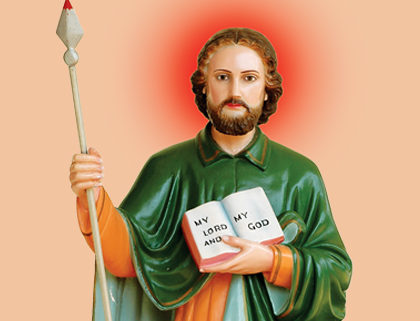What is Faith – may benefit your class!
by admin
What is faith?
-Tison Thomas-
Faith is believing in something of which we do not have proof. Faith is the assurance of things hoped for, the conviction of things not seen (Hebrews 11:1; Catechism 146).
What are some examples of faith?
When we buy a can of beans at the grocery store, we do not have proof that the can contains beans, because we cannot see inside it. It is possible that the factory mislabeled the can. Even though we do not have proof until we open the can at home, we do have a good reason to believe that the contents match the label because the label has never been wrong in the past. This is a good example of faith. On the other hand, if none of the cans in the grocery store were labeled (e.g., a flood washed all the labels away), and we randomly chose an unlabeled can believing it contained beans, this would be foolishness, not faith. On matters of faith we do not have proof, but we should have a good reason to believe they are true.
Faith is Certain
Faith is more certain than human knowledge (Catechism 157).
What is an opinion? Can our opinions be wrong? Can God be wrong?
Since God created everything, He knows everything, and He cannot be wrong. Our opinions can be wrong, but God cannot be wrong, and He cannot lie because He created the truth. Personal beliefs often contradict what faith teaches, but our human reason is imperfect and subject to error. Often, God’s messages go against what society practices (Matthew 5:43). We must believe in what God teaches us because God is without error and cannot lie.
Some examples of where society contradicts God’s plan.
People often state their personal beliefs with a lot of conviction, but personal beliefs and opinions do not have the power to change reality. For example, just because a person does not believe in Purgatory does not mean that they won’t find themselves there after death. Faith exists only while we are on this earth. Once in Heaven, our personal understanding will no longer depend on faith. Everyone will see things exactly as they are. There are no religious debates in Heaven.
Freedom of Faith
Nobody is forced to embrace the faith against his will; we are free to choose. Indeed, Christ invited people to faith and conversion, but never coerced them. We are free to believe what we want. God does not force us to believe in Him (Catechism 160).
Through this freedom of choice, God allows humans, through their own free will, to return His love. If coercion were part of God’s plan, it would not be true love on our part. For example, is there a difference between being forced to marry someone versus choosing to marry them because you love them? This is the reason God will not violate our free will and force us to love Him.
Words are one thing, but we show God how much we love him by the choices we make. When we make choices that hurt God or other people (sin), we are not returning God’s love. Life is full of choices. Christ teaches us that God’s ways are not the same as the ways of the world. To choose God often means going against popular opinion.
Faith and Science
Science is the study of God’s creation. There are no discrepancies between true science and faith, for it is God Himself who made the secrets of nature what they are. God cannot contradict Himself (Catechism 159). Science and various forms of research can be the wonderful quest to understand God’s beautiful creation.
Scientists often view their research as a quest of discovery into God’s wonderful creation. There once was a man who was so taken by the music of Mozart that he came to the realization that this beautiful music could only have come from God. His admiration of this beautiful music led him to the personal realization that there must be a God. He then decided to choose a profession that would allow him to devote his life to discovering more about God’s beautiful creation. That man’s name was Albert Einstein.
Necessity of Faith (Catechism 161)
Faith is necessary for salvation. The Lord himself affirms in Mark 16:16, “He who believes and is baptized will be saved, but he who does not believe will be condemned” (Catechism 183).
Why is it necessary to have faith in God? One answer: we need faith to find God in this life.
We are eternal creatures. We will never cease to exist. If we compared our “total” lifetime to all the sand on all the beaches of the world, then our life here on earth would be but one grain of sand in our whole existence. But it is a very important grain of sand, as this short life will define how we will spend the next trillion years and then all of eternity.
What does it mean to be an eternal creature?
In this life, everything counts; everything matters: every thought, word and deed, during every waking moment. Things done for love will last forever and can be taken with you into your life after death. Things done out of selfishness will perish.
Many adults are focused on their retirement. Which retirement do you think is more important to focus on, the twenty-year retirement here on Earth or the infinite retirement in Heaven?
Being an atheist is a no-win proposition. If the atheist is right and there is no God, then he will never find out, but if the atheist is wrong, he will regret it forever. Believing in God is a no-lose proposition. If the believer is right, he will enjoy the rewards forever, but if the believer is wrong, he will never know it.
Faith and the Church
Faith is not an isolated act. No one can believe alone, just as no one can live alone (Catechism 166). The Church is a community of believers. .
Faith is a supernatural gift from God. In order to believe, man needs the interior help of the Holy Spirit (Catechism 179). We should pray to the Holy Spirit to increase our faith, because we cannot do it solely through our own intellect. The Church faithfully guards the faith, which was delivered to the saints and hands on the Apostles’ profession of faith from generation to generation (Catechism 171).
One does not need to be a theologian to be a good Catholic. Over the last 2,000 years the Catholic Church has had thousands of theologians, priests, bishops, and popes who have devoted their lives to developing our beautiful Catholic faith. We have a personal assurance from Jesus that the Church’s teachings have the backing of Heaven. “Whatever you hold bound on earth shall be bound in Heaven” (Matthew 18:18). Said another way, the Church’s teachings on faith and morals cannot lead us astray.
Hope this helps with your class and teachings.
Thank you and may God Bless you,
Tison Thomas
Recommended Posts

Feast of the Immaculate Conception – December 8
December 08, 2017

Prayer for hope & strength
July 09, 2017

St. Thomas and the Eucharist
July 04, 2017

